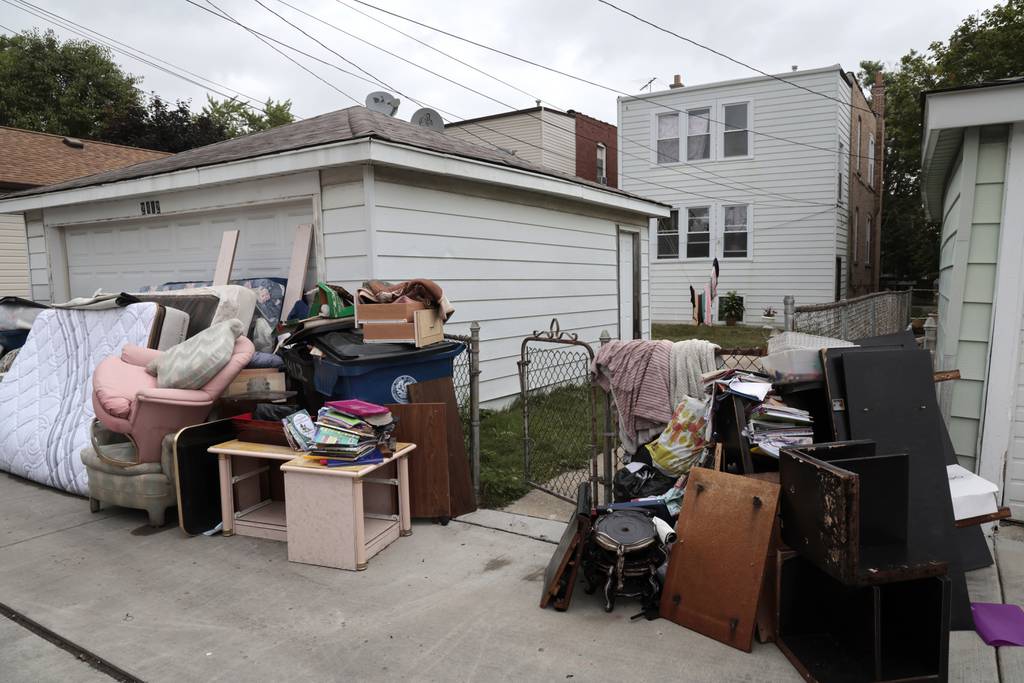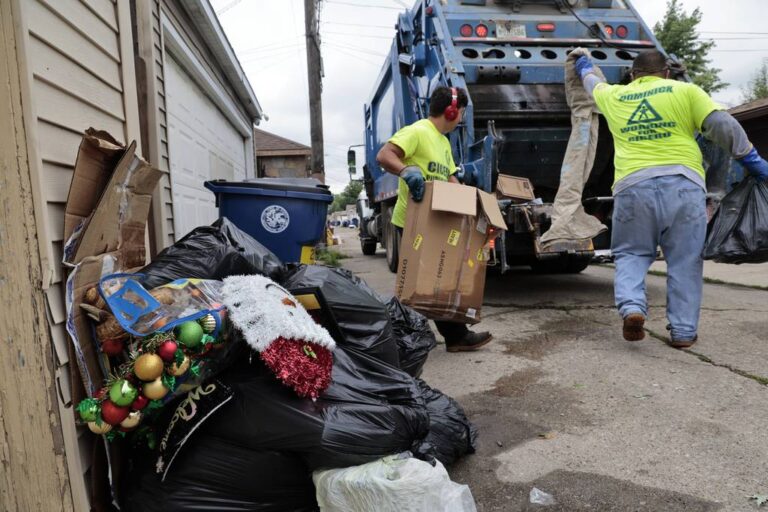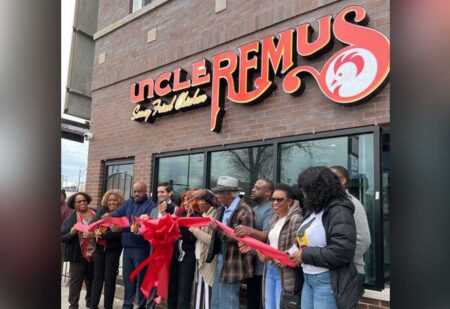For the second time in four days, severe thunderstorms swept through parts of Chicago and suburban Cicero on Wednesday, dumping another 1 to 2 inches of rainfall on neighborhoods still trying to recover from the weekend’s downpours.
Some pockets of the metro area saw up to 3 inches of rain, said National Weather Service meteorologist Todd Kluber. But for those unfortunate enough to have gotten caught outside, it likely looked similar to the 3 to 7 inches of rain that hit the city and suburbs over the weekend because the soil is still waterlogged.
“Any heavy rain at this point can almost go straight to runoff instead of absorbing into the ground because the ground is still so saturated,” Kluber said. “Most of the time, (after) a couple of inches even in a short period, we see some minor flooding. But in this case, because we had a really saturated ground from this past weekend, it quickly allowed for some of that flooding to develop.”
Silvia Mazon said she was on her way Thursday morning to report damages to her Cicero home from Sunday’s flooding. Though she said she did not experience flooding from the storms Wednesday evening, her niece and other family members did.
“It’s concerning that this keeps happening over and over again,” Mazon said. She said she plans on going to a town hall meeting Tuesday with neighbors to continue demanding city officials step up and help them get financial support to start over again — not only homeowners, but also families renting basement apartments who have lost all their belongings.
Wednesday’s thunderstorms, during which more than 3 million people were under a flash flood warning, came hot on the heels of flash floods Sunday. According to the weather service, which called the weekend flooding “potentially life-threatening,” Cicero, Berwyn and some neighborhoods in Chicago each saw over 8 inches of rainfall that day.
The weekend storms also managed to dampen plans for the NASCAR Chicago Street Race, when organizers were forced to postpone the Xfinity Series Loop 121 partway through on Saturday and then call it off Sunday. The start of the Cup Series Grant Park 220 on Sunday was delayed and the race shortened to 75 laps.
Much like the weekend flash floods, the midweek storm damaged homes and affected streets with standing water, flooded lanes and stranded vehicles.
“Once you start getting into the core of the metro, a very urbanized area, that’s where 2 inches really hit,” Kluber said. “The water’s got to go somewhere. And if it’s raining so hard — we’re seeing rainfall rates of half an inch in just 10 minutes, so there’s a lot of rain in a very, very short period of time — that’s where we start to see the problems.”
These recent heavy rains and floods have raised tensions among residents and officials about disaster preparedness and response in terms of how homes and roads in Chicago and nearby suburbs are being protected. One such point of contention was the locks the Metropolitan Water Reclamation District uses to reverse the flow of the Chicago River when its level exceeds the elevation of Lake Michigan during extreme weather events.
According to an MWRD news release, during Sunday’s heavy rains, the elevation of the North Shore Channel and the Chicago River downtown exceeded that of Lake Michigan, so the gates were opened that afternoon allowing sewage and runoff to flow into Lake Michigan. The North Shore Channel gate was closed 7 ½ hours later and the Chicago River gate was closed early Monday morning.
“The real problem, however, is the Metropolitan Water Reclamation District, which only opened its drainage lines very late, again helping Chicago neighborhoods to drain first before opening the locks for suburban communities like Cicero,” said Ray Hanania, spokesperson for the town of Cicero, in a written statement to the Tribune. “Cicero has absolutely no control over these locks, which are controlled by the MWRD, which has one responsibility to manage rainwater drainage. With a $2 billion-plus budget, they don’t do an excellent job for the suburbs.”
The MWRD said in its news release that if it “were to open the lock and gates too early, Lake Michigan would have a tsunami effect, overtaking the river and flooding everything in its path in downtown Chicago.”
The city of Evanston issued statements closing all beaches to swimming Tuesday and Wednesday because of unsafe bacteria levels after the MWRD opened its stormwater gates Sunday.
Frank Aguilar, Cook County Board commissioner of the 16th District, said he met with several city leaders to ask Gov. J.B. Pritzker to declare Cook County a disaster zone so residents can receive federal funding. For now, Berwyn and Cicero are collecting data on the damage.
After Sunday’s flooding, the mayor’s office in Berwyn called for a disaster declaration Monday because of extensive property damage, seeking responses from the Cook County Department of Emergency Management and Regional Security and the Illinois Emergency Management Agency.
The office is urging Berwyn residents to complete an online form on the city’s website if their homes experienced extensive damages due to the heavy rains.

Cicero Town President Larry Dominick designated Cicero a disaster area after Sunday’s floods. That declaration will enable the city to request aid from the Federal Emergency Management Agency. According to a news release, Dominick has obtained assistance from Cook County and is collaborating with state officials to acquire additional resources.
Cicero needs to provide damage assessments to be eligible for FEMA and other kinds of assistance, so officials are asking residents to fill out the online form on the city’s website and describe the extent of damages.
Aguilar, the county board commissioner, urged homeowners, business owners and renters from Cook County to report damages from the floods. That is the next step to get aid for those affected, he said.
“Working-class people … are suffering, the alleys are packed with mattresses and other furniture that was destroyed,” Aguilar said, adding that Cicero needs to clean up these alleyways quickly to avoid health hazards.







